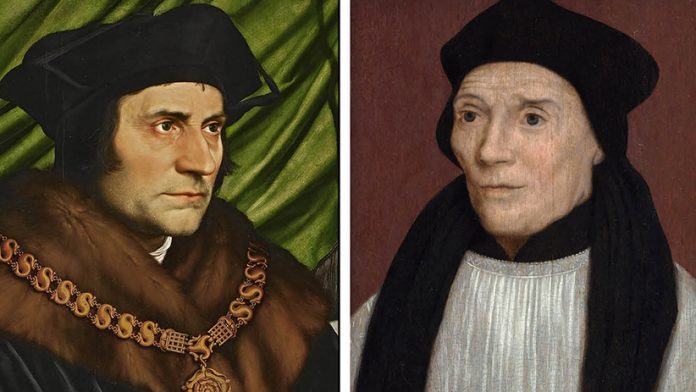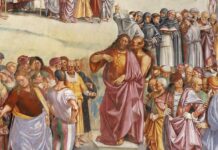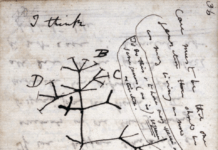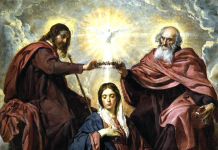
Two glorious martyrs of the ‘Reformation’ are celebrated today. First, Saint Thomas More, husband, father, lawyer, sometime chancellor of England, martyred in 1535 along with his compatriot Saint John Fisher, Bishop of Rochester and cardinal of the Church.
Thomas More at first tried his vocation with the London Carthusians – who would end up being Henry’s first victims, put to death in horrendous fashion. Thomas would later watch in admiration from prison as they were marched to their death ‘as though going to a wedding‘, he remarked to his daughter, Meg.
As the presence of the daughter signifies, Thomas was ultimately called to marriage and the profession of law. In 1505, he was betrothed to the lovely Jane Colt, who bore three children, before dying too young in 1511. Thomas quickly married the widow Alice Middleton, who helped raise his children, whom he educated well, not least his beloved daughter Margaret, whom he called Meg. He was ahead of his time, in more ways than one – a man, indeed, for all seasons. As he once quipped: “Many are schooled, but few are educated“.
Thomas, bright, intelligent and with a clear conscience, quickly rose up the ranks of then-Catholic England, eventually to the post of Chancellor, second only to the king. He wrote indefatigably, his most famous work being the satirical political satire, Utopia, whence we get that term in our lexicon, which literally means ‘no place’, but has come to mean a ‘good place’ (but that would be eu-topia)
John Fisher was an academic, and saintly, priest, educated at Cambridge, and adopting the new humanism sweeping the land, but disdaining any of its secularizing implications. His was a truly devout life, immersed in prayer and sacrifice, especially the Holy Mass, and his devotional works are still much worth reading. In 1504, he was made bishop of Rochester; devoid of earthly, and deadly, ambition, he stayed in that humble see for 31 years, until his execution at the King’s orders.
Both saints are martyrs of conscience, but, more to the point, as John Paul II made clear in Veritatis Splendor, they are martyrs for the truth– put to death in odium fidei, in hatred of the Faith, and what that Faith obliges us to do, and not do. More’s case was made famous for a wider audience in the 1954 play by Robert Bolt, and the subsequent 1966 film (the martyr portrayed in immemorial fashion by Paul Scofield). Evocative and timely though his portrayal be, Bolt overplayed the role of More’s subjective conscience, that he just felt it was wrong for him to go along with the king’s Oath. Historically, however, More, the king’s sometime chancellor and confidante, tried to find a way, by hook or by crook with all his legal knowledge, to agree with the King in his claim for ‘Royal Supremacy over the Church in England’, but found he could not. And he would have said that others should not either. It was objectively wrong to sign the Act, by which one was signing away one’s allegiance to the Church, and, as a consequence, to Christ.
So every one who acknowledges me before men, I also will acknowledge before my Father who is in heaven; but whoever denies me before men, I also will deny before my Father who is in heaven. (Mt 10:32)
To ensure that we live in and by the truth, Thomas More saw the need for law, human law, but especially the divine law of God as embodied and instantiated in the Catholic Church, upon which all human law is – or should be – based. Without law, and a solid foundation in truth, conscience becomes something purely subjective, relativist, unhinged and, ultimately, destructive. Thomas’ sharp mind perceived, at least in inchoate fashion, the social and spiritual chaos that would be unleashed by his King, Henry VIII, making his own conscience the arbiter of both the Church and the State – the will of the King is the law, divine, human, secular – all in Machiavellian fashion.
Most did not see, or refused to see, the evil. Every bishop in the land acquiesced to the King, signing the sacrilegious Oath of Supremacy – that Henry was ‘head of the Church in England’. All except one: The indomitable John Fisher, whose saintly ascetical life and courageous example should be a model for our bishops through the ages. Like all saints, he never rested easy: A learned and prayerful man, who, when past the age of fifty, although fluent in Latin, he thought he should learn Greek, so as to better understand Scripture – the wave of humanistic studies was waxing strong. As the Chinese adage has it, the best time to plant a tree is twenty years ago; the second best time, is today. And what holds for trees, holds for Greek (and the violin, as I am discovering).
Fisher also saw through the King’s machinations, and Henry could not stand for that: While in prison, Pope Paul III made the good bishop a cardinal, to which Henry replied: Let the Pope send him the red hat, for head he shall have none to wear it! True to his word, Henry had the good bishop Fisher beheaded on this day, June 22nd, in 1535, and Thomas followed on July 6th. I suppose Cardinals first, Chancellors, second.
Soon after Henry’s schism, we would have the Peace of Augsburg (1555), which enshrined the principle of cuius regio, eius religio, that the religion of the prince is the religion of the land and, by extension, the people. Which means in practice that the prince can do more or less whatever he pleases. The rest of the hoi polloi would just have to follow along, under the deformed and seared conscience of whatever ‘king’ came along. Hence, half a century on, we have moved on from the Tudors to the Trudeaus, both proclaimed Catholics, both flouting the Church, and her teachings, in which they profess to believe.
In Henry’s case, his lust and ambition ruined medieval and merrie England. After Henry had separated from the Church, he dissolved the monasteries, murdered or dispersed the monks and hoarded their wealth, impoverished the land, the churches ransacked, beggary and immorality rife, with a very few, very ignoble and obsequious men, enriched by Henry, ensuring that Catholicism would never return to the land. Their descendants inhabited places such as Northanger ‘Abbey’.
Oh, we know that England had a good run of it – the whole Elizabethan era, the command of the seas and the Empire upon which the sun never set – yet these had their time, based on the Christian principles that remained, and eventually ran their course. There is a lot of ruin in a nation, wrote Adam Smith, and we are seeing that ruin in what tragic tatters are left of Britain today.
And not just Britain: We are all living through the rippling and deleterious effects of the momentous rift begun with the schism of ‘King Harry’. As the future Pope Leo XIII would put it, without the one, true religion, no society can be well governed, and the further we – as individuals and as a society – drift from the one, holy, Catholic and apostolic Church, the worse off things will be.
The whole case of Henry’s quest for an annulment from his lawful wife Catherine so he might marry his paramour Anne Boleyn seems rather quaint to us now. If he had asked for his marriage to be declared null and void in today’s milieu, it would likely be handed to him on a silver platter by a local tribunal, instead of the heads of More and Fisher.
But law is law, and marriage, marriage, and the Church, the Church. They all bind us in conscience in whatever age in which we live, as More so rightly and wisely saw. As he declared to his son-in-law Roper, who wanted to tear down the laws to rebel against the King and his heinous henchmen:
William Roper: So, now you give the Devil the benefit of law!
Sir Thomas More: Yes! What would you do? Cut a great road through the law to get after the Devil?
William Roper: Yes, I’d cut down every law in England to do that!
Sir Thomas More: Oh? And when the last law was down, and the Devil turned ’round on you, where would you hide, Roper, the laws all being flat? This country is planted thick with laws, from coast to coast, Man’s laws, not God’s! And if you cut them down, and you’re just the man to do it, do you really think you could stand upright in the winds that would blow then? Yes, I’d give the Devil benefit of law, for my own safety’s sake!
Ah, yes, the ‘benefit of law’. There are Catholics today who want to tear down the Church’s law to remove the ‘bad bishops’, even, it seems, the Pope himself. But there is no Church without a hierarchy, one can only be put in place and maintained by canonical and ecclesiastical law, whatever the apparent worthiness of the occupants of those seats of authority.
There is more to be said on that, but, for now, let us simply recall the witness of these two glorious martyrs, and the countless souls who would give their blood for the one true Faith, in England, and across the world.
Saints Thomas More and John Fisher, orate pro nobis!










